How to Improve Your Credit With a Sherry Beckley Debt Validation Letter
No one enjoys paying debts, or taking the hit they make on a credit report, especially if they've been sent to collections. What's worse? Paying debts for accounts or amounts you don't actually owe. How can you make sure you're only paying what you owe?
- Should you try to contact each company?
- How many times will you be stuck on hold? For how long?
- When you finally talk to a person, will they actually be able to help?
Sending a can help make sure collection agencies aren't trying to collect what they shouldn't. Sometimes, it can even relieve you of having to pay a debt, depending on how a collection agency responds to your request. Not sure how to get started? DoNotPay can help verify your debts and start cleaning up your credit.
What Is a Sherry Beckley Debt Validation Letter?
As promoted by Sherry Beckley, a is a specific way of contacting debt collectors in order to verify the details of any debt they are attempting to collect from you. In it, you'll request the information they have about the debt, why they think you are the person who owes it and explains that they must verify the debt is yours or must stop collecting and remove it from your account and credit report.
Debt Validation Vs. Debt Verification
The terms debt validation and debt verification are often used to mean the same thing – the process you use to make sure a debt being collected is one you actually owe and that it's being collected according to the rules set out by the Fair Debt Collection Practices Act. The terms can also mean a letter sent to you from a collection agency about the debt they are attempting to collect from you. In those cases, the letter is usually called a debt validation letter.
Why Is a Debt Validation Letter Important?
A debt validation letter is an important tool in your toolbox for cleaning up your credit. Debts are often sold to different collection agencies and it's easy for mistakes to be made. Debts can be assigned to the wrong person, amounts can be wrong, and some debts may be past the legal time period for collection. A debt validation letter can help:
- Verify that debt in the collection is actually one you owe
- Specify the precise details of the debt they are trying to collect from you
- Starts the clock on response time from the collection agency
- Protect you from scams and illegitimate collection agencies
- Pause the collection process while debt is verified
If a collection agency cannot verify the debt, it cannot legally be included in your credit report.
How to Clean Up Your Credit With a Debt Validation Letter On Your Own
When you write a debt validation letter to a collection agency, if it's within 30 days after you learn about it, the agency is legally required to send you a written response about that debt within 5 days. If it's more than 30 days after you first received notice that the debt had gone to collections, you can still send a debt validation letter, though they are not legally required to respond at that point.
Writing a Debt Validation Letter
In order to write your debt validation letter, you'll need to gather some information and be clear in your request. Make sure you have the information on a debt from the collection agency's notification you are writing about and be as thorough as possible in your response. In your letter, indicate you are disputing a debt, requesting they verify it, and, if they can't verify it, to remove it from your credit report. You want to learn:
- Why a collection agency thinks you're the one who owes the debt
- How much is owed and how old the debt is
- Whether the agency is allowed to collect this debt
To do so, you may want to ask:
- The name of the original creditor—who did you originally owe?
- Documentation that proves you owe the debt, such as an original contract
- The last billing statement from whoever the debt was originally owed to
- The amount owed on that last statement
- If and when the last payment was made on the debt
- If the debt is within your state's statute of limitations to collect
Be sure to send your letter by Certified Mail with a Return Receipt so you have proof of when they receive your request.
What Happens After You Write Your Letter?
Once the collection agency receives your letter, they must stop attempting to collect the debt until they have responded to your request.
If the debt is verified – that is, if the debt really is one you owe, an accurate amount, and the collection agency is licensed to collect it, then you are on the hook for it, though you may be able to negotiate a settlement and can use pay for delete letter to have it removed from your credit report once it's paid off.
If the debt is not verified, the collection agency must stop attempting to collect it from you and must request it be removed from your credit report. If the collection agency doesn't respond, you should dispute the entry on your credit report, asking it to be removed.
DoNotPay Can Help Clean Up Your Credit Easily, Including Debt Validation
Deadlines, statutes of limitations, validations, verifications – if it all sounds like a complicated, time-consuming mess and more work than it's worth to clean up your credit, don't lose hope. DoNotPay can simplify the whole process so you can raise your credit score and get your credit report looking as good as possible in 3 easy steps:
- Search Clean Credit Report on DoNotPay.
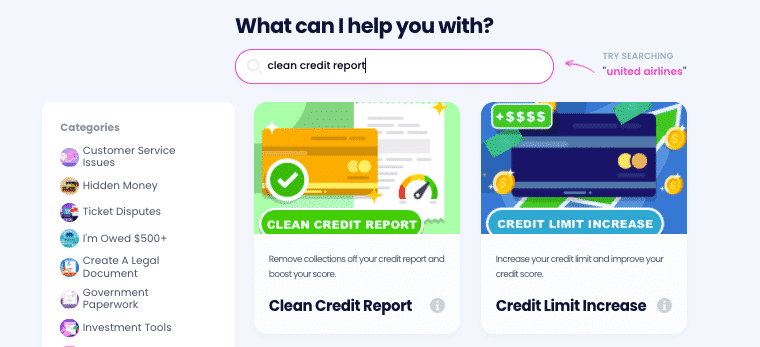
- Prepare a recent copy of your credit report that you can use as reference.
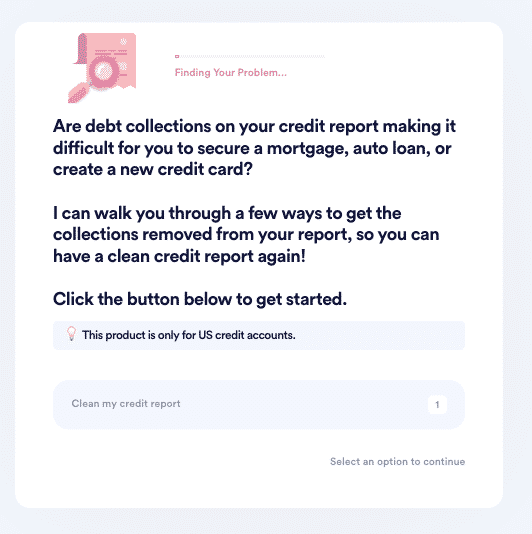
- Let us guide you through the 4 potential options:
- If you've already paid off your debt, we'll help you file a Goodwill Removal Request to get it removed.
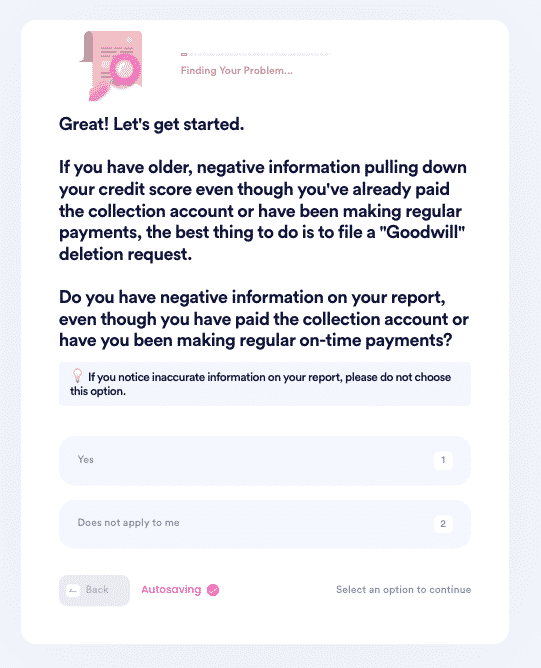
- If you notice any errors in your report (we have a list of common errors you can use!), we'll help you file a credit dispute to the creditor or major credit bureaus.
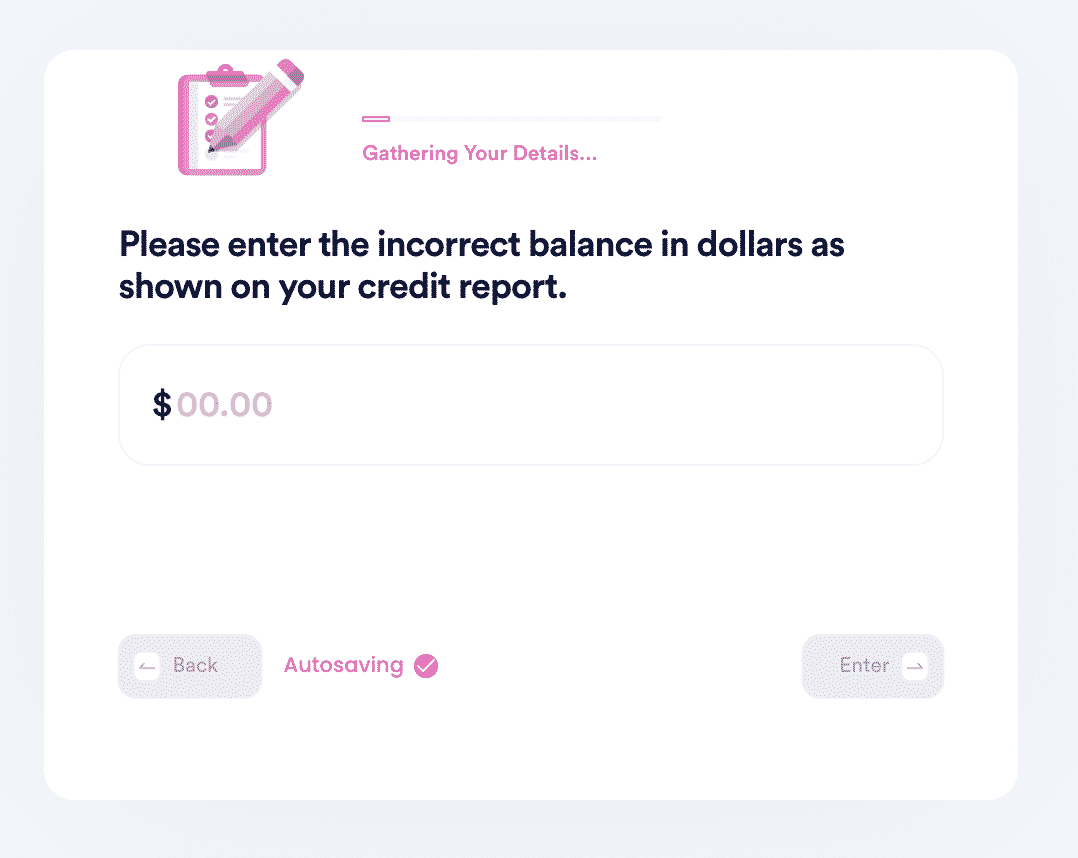
- If there are no errors, we'll check if you're still eligible to file a debt validation request. If they can't validate your debt, they're required to remove it from your report and they can't collect it!
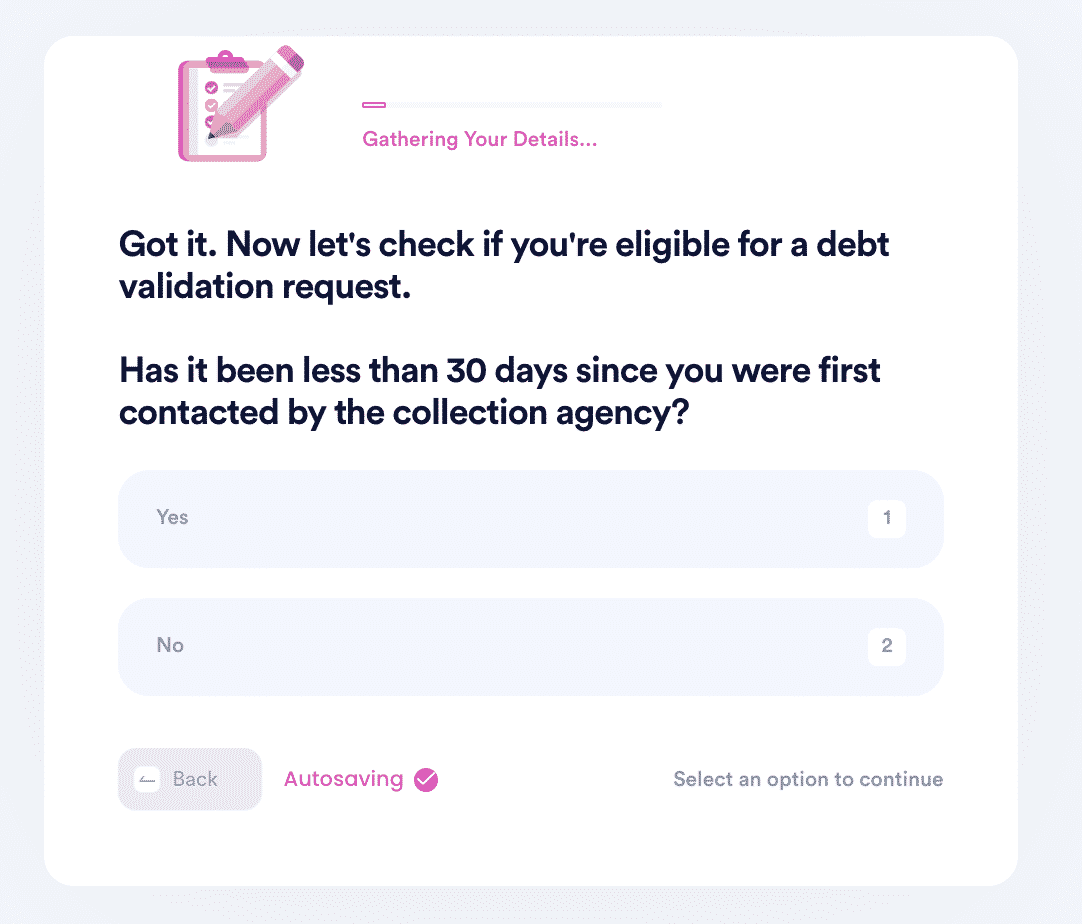
- Lastly, if none of the above options work, we'll help you file a pay-to-delete negotiation letter. You can customize the amount you are willing to pay in exchange for getting the item removed.
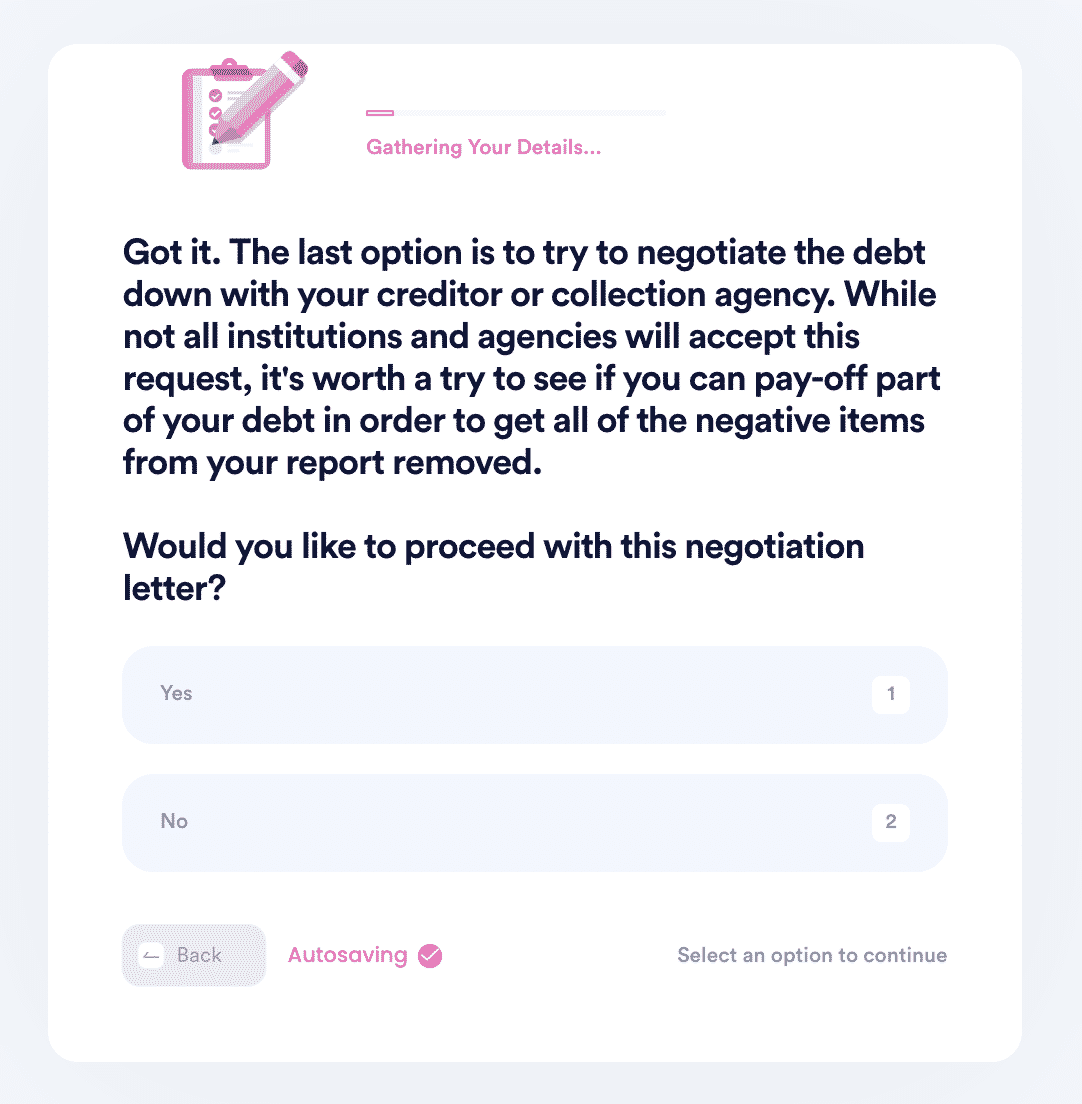
Why Use DoNotPay to Clean Up Your Credit
Using DoNotPay to clean up your credit can take all the work out of repairing your credit so you can spend less time on the process and get greater benefits. DoNotPay's process is:
- Fast – You spend a few minutes upfront, we'll spend the hours behind the scenes.
- Easy – A few clicks, a little information, and we'll put it all together for you without complicated forms and paperwork.
- Successful – DoNotPay has a proven track record in helping customers fix credit and many other problems.
DoNotPay Can Help You Fix Many Credit Problems
DoNotPay offers many other services to help fix your credit, including those to:
| Improve your credit score | Send a credit dispute letter |
| Remove late payments from your credit report | Remove inquiries from your credit report |
You Can Solve So Many Problems With DoNotPay
In fact, DoNotPay can help you with all kinds of problems, including:
- Canceling any subscription or service
- Finding unclaimed money
- Getting free trials without being charged
 By
By